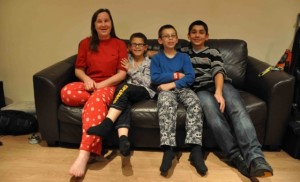
Dr Esther Dermott, Reader in Sociology, School of Sociology, Politics and International Studies
In popular and political discourse it is parents who must take responsibility for children’s social, emotional and educational success or failure; as the Deputy Prime Minister Nick Clegg phrased it in 2010, “Parents hold the fortunes of the children they bring into this world in their hands”. Following on from this dominant view, it is perhaps unsurprising that it is poor parents who have come in for most criticism, with the suggestion that their children’s relative lack of qualifications and difficulty in obtaining employment that avoids a reliance on benefits, is their fault.
The Field Report which was commissioned by the government in 2010 to develop a strategy to address child poverty explicitly refers to the role of ‘good parenting’ and notes at the outset that “We imperil the country’s future if we forget that it is the aspirations and actions of parents which are critical to how well their children prosper” (p11). Getting poor parents to be better at parenting has therefore become a central plank in the Coalition government’s attempt to improve children’s future wellbeing.
Analysis of the Poverty and Social Exclusion survey[i] challenges the view that poor parents are poor at parenting. Whether a household was poor made no significant difference to whether parents frequently engaged in most ‘good’ parenting activities. Parents with lower incomes or who felt poor were as likely to engage in reading, helping with homework, playing games and doing sports as those who weren’t poor. On two other measures – watching television together and having an evening meal as a family – parents whose household income was low (below 60% of the median) were actually more likely to participate frequently than other parents.
The research, using a statistical method which allows researchers to find groups with distinct underlying patterns, also found there was no evidence of a distinct group of parents who consistently do not engage in these high-profile parent-child activities. This is potentially important since recent political discourse has not only promoted the idea that ‘poor parenting’ exists but also emphasises the existence of a group of parents who persistently fail to engage in parenting activities that are beneficial for their children.
These findings support the view that the associations made between poverty and poor parenting are ideologically driven rather than based on evidence. Claims that families who are poor do not engage in good parenting practices are misplaced. And we found no evidence for the existence of a group of ‘delinquent’ parents who fail to participate in parent-child activities. In fact, the results can be read as confirmation of a culture of ‘intensive parenting’ in which parents are expected to engage in a range of child-centred activities on a regular basis. Whether for good or ill, the mantra of involved parenting appears to correspond with parents’ everyday practices.
This blog draws on work presented by Dr Esther Dermott and Mr Marco Pomati at the Third Peter Townsend Memorial Conference which took place in London last month. You can read more information about this research on the Poverty and Social Exclusion website.
[i] The research was funded by the ESRC RES RES-060-25-0052.

